EU Law: Challenges and Implications
VerifiedAdded on 2023/01/11
|9
|3465
|31
AI Summary
This document discusses the challenges and implications of EU law in the context of trade activities and competition law. It explores the rules, applications, and exceptions under Article 101 of TFEU. Case studies and conclusions provide insights into the impact on businesses and market competition.
Contribute Materials
Your contribution can guide someone’s learning journey. Share your
documents today.
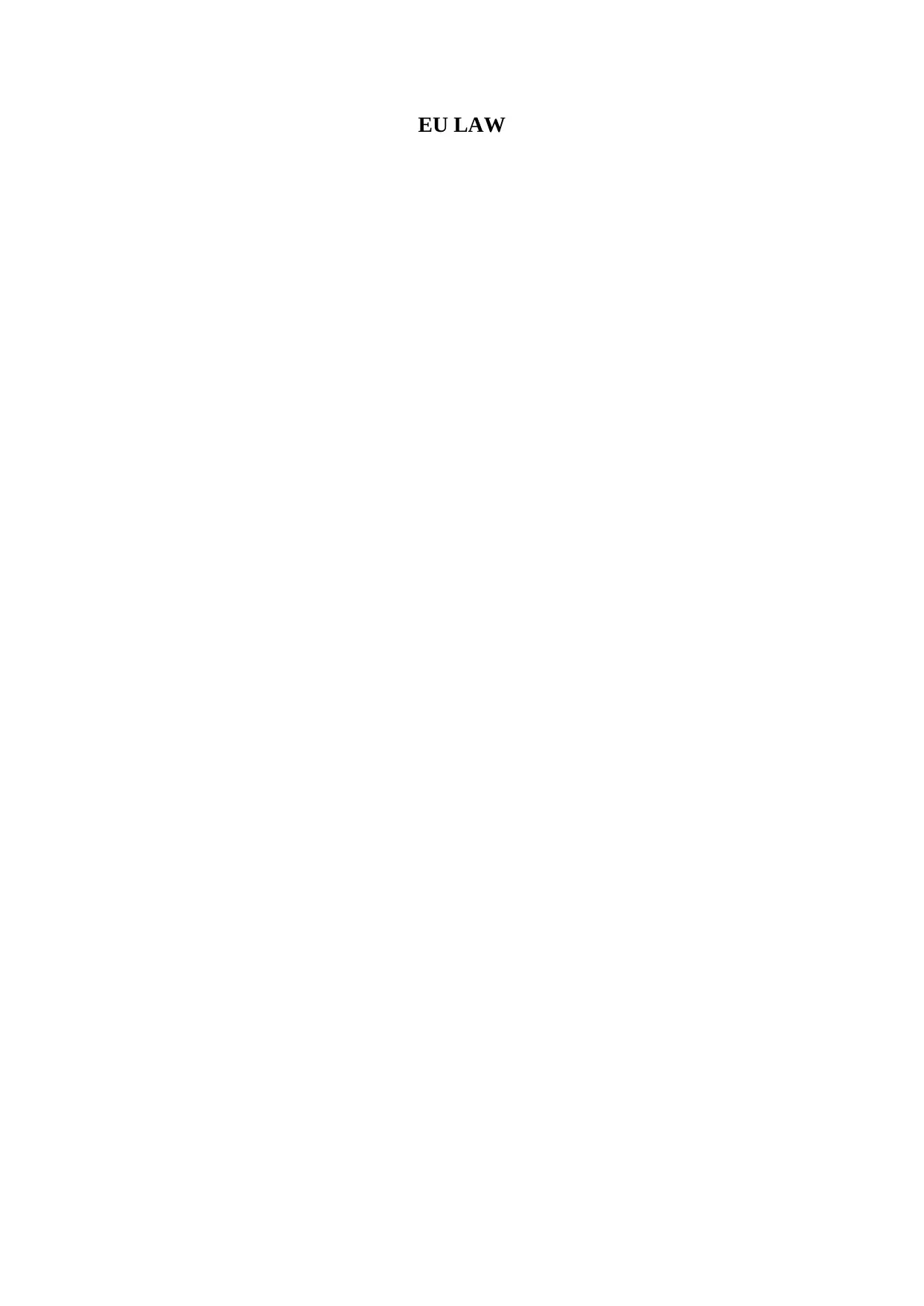
EU LAW
Secure Best Marks with AI Grader
Need help grading? Try our AI Grader for instant feedback on your assignments.

Contents
QUESTION...........................................................................................................................................3
PART A.............................................................................................................................................3
PART B.............................................................................................................................................4
QUESTION...........................................................................................................................................3
PART A.............................................................................................................................................3
PART B.............................................................................................................................................4
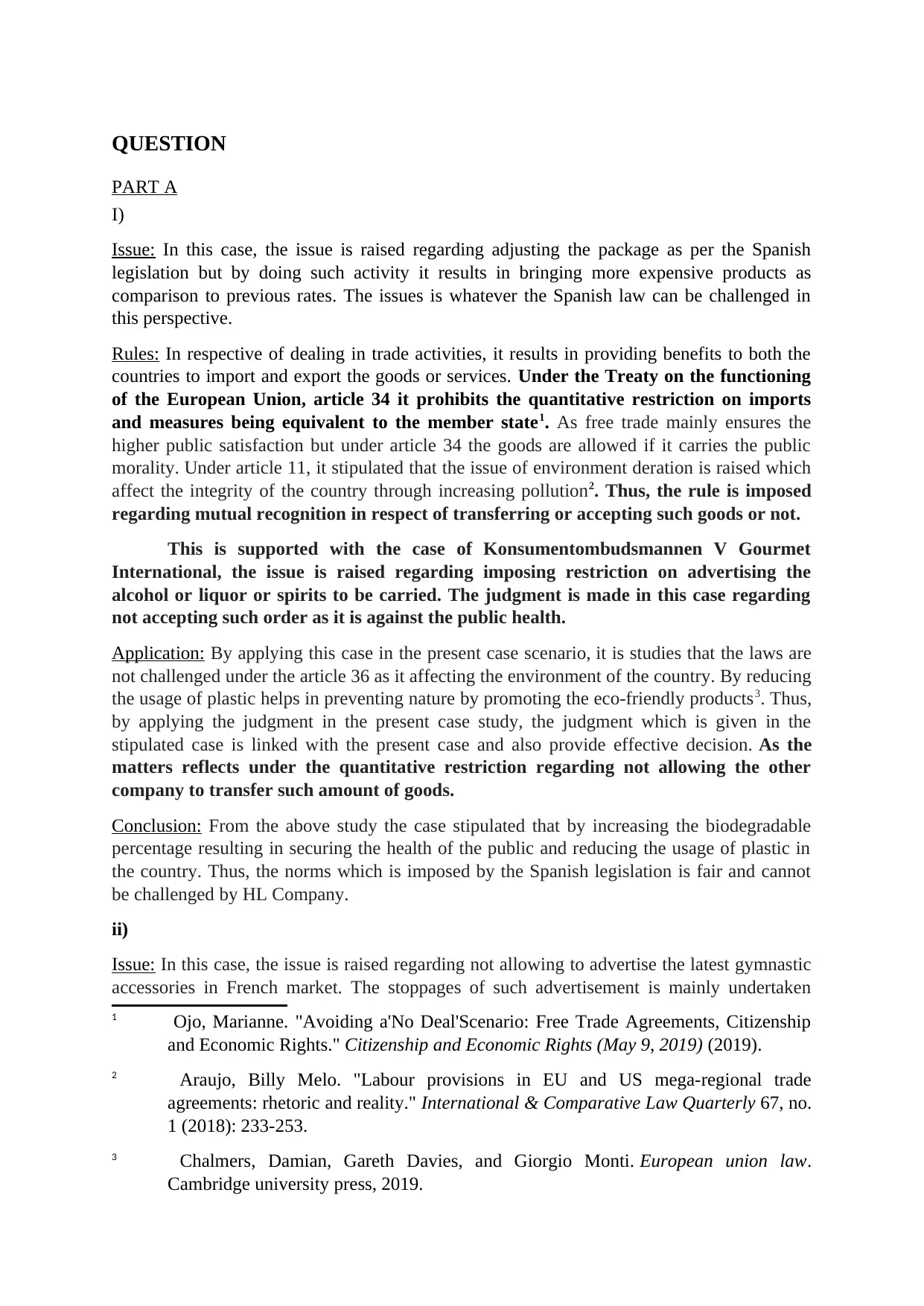
QUESTION
PART A
I)
Issue: In this case, the issue is raised regarding adjusting the package as per the Spanish
legislation but by doing such activity it results in bringing more expensive products as
comparison to previous rates. The issues is whatever the Spanish law can be challenged in
this perspective.
Rules: In respective of dealing in trade activities, it results in providing benefits to both the
countries to import and export the goods or services. Under the Treaty on the functioning
of the European Union, article 34 it prohibits the quantitative restriction on imports
and measures being equivalent to the member state1. As free trade mainly ensures the
higher public satisfaction but under article 34 the goods are allowed if it carries the public
morality. Under article 11, it stipulated that the issue of environment deration is raised which
affect the integrity of the country through increasing pollution2. Thus, the rule is imposed
regarding mutual recognition in respect of transferring or accepting such goods or not.
This is supported with the case of Konsumentombudsmannen V Gourmet
International, the issue is raised regarding imposing restriction on advertising the
alcohol or liquor or spirits to be carried. The judgment is made in this case regarding
not accepting such order as it is against the public health.
Application: By applying this case in the present case scenario, it is studies that the laws are
not challenged under the article 36 as it affecting the environment of the country. By reducing
the usage of plastic helps in preventing nature by promoting the eco-friendly products3. Thus,
by applying the judgment in the present case study, the judgment which is given in the
stipulated case is linked with the present case and also provide effective decision. As the
matters reflects under the quantitative restriction regarding not allowing the other
company to transfer such amount of goods.
Conclusion: From the above study the case stipulated that by increasing the biodegradable
percentage resulting in securing the health of the public and reducing the usage of plastic in
the country. Thus, the norms which is imposed by the Spanish legislation is fair and cannot
be challenged by HL Company.
ii)
Issue: In this case, the issue is raised regarding not allowing to advertise the latest gymnastic
accessories in French market. The stoppages of such advertisement is mainly undertaken
1 Ojo, Marianne. "Avoiding a'No Deal'Scenario: Free Trade Agreements, Citizenship
and Economic Rights." Citizenship and Economic Rights (May 9, 2019) (2019).
2 Araujo, Billy Melo. "Labour provisions in EU and US mega-regional trade
agreements: rhetoric and reality." International & Comparative Law Quarterly 67, no.
1 (2018): 233-253.
3 Chalmers, Damian, Gareth Davies, and Giorgio Monti. European union law.
Cambridge university press, 2019.
PART A
I)
Issue: In this case, the issue is raised regarding adjusting the package as per the Spanish
legislation but by doing such activity it results in bringing more expensive products as
comparison to previous rates. The issues is whatever the Spanish law can be challenged in
this perspective.
Rules: In respective of dealing in trade activities, it results in providing benefits to both the
countries to import and export the goods or services. Under the Treaty on the functioning
of the European Union, article 34 it prohibits the quantitative restriction on imports
and measures being equivalent to the member state1. As free trade mainly ensures the
higher public satisfaction but under article 34 the goods are allowed if it carries the public
morality. Under article 11, it stipulated that the issue of environment deration is raised which
affect the integrity of the country through increasing pollution2. Thus, the rule is imposed
regarding mutual recognition in respect of transferring or accepting such goods or not.
This is supported with the case of Konsumentombudsmannen V Gourmet
International, the issue is raised regarding imposing restriction on advertising the
alcohol or liquor or spirits to be carried. The judgment is made in this case regarding
not accepting such order as it is against the public health.
Application: By applying this case in the present case scenario, it is studies that the laws are
not challenged under the article 36 as it affecting the environment of the country. By reducing
the usage of plastic helps in preventing nature by promoting the eco-friendly products3. Thus,
by applying the judgment in the present case study, the judgment which is given in the
stipulated case is linked with the present case and also provide effective decision. As the
matters reflects under the quantitative restriction regarding not allowing the other
company to transfer such amount of goods.
Conclusion: From the above study the case stipulated that by increasing the biodegradable
percentage resulting in securing the health of the public and reducing the usage of plastic in
the country. Thus, the norms which is imposed by the Spanish legislation is fair and cannot
be challenged by HL Company.
ii)
Issue: In this case, the issue is raised regarding not allowing to advertise the latest gymnastic
accessories in French market. The stoppages of such advertisement is mainly undertaken
1 Ojo, Marianne. "Avoiding a'No Deal'Scenario: Free Trade Agreements, Citizenship
and Economic Rights." Citizenship and Economic Rights (May 9, 2019) (2019).
2 Araujo, Billy Melo. "Labour provisions in EU and US mega-regional trade
agreements: rhetoric and reality." International & Comparative Law Quarterly 67, no.
1 (2018): 233-253.
3 Chalmers, Damian, Gareth Davies, and Giorgio Monti. European union law.
Cambridge university press, 2019.
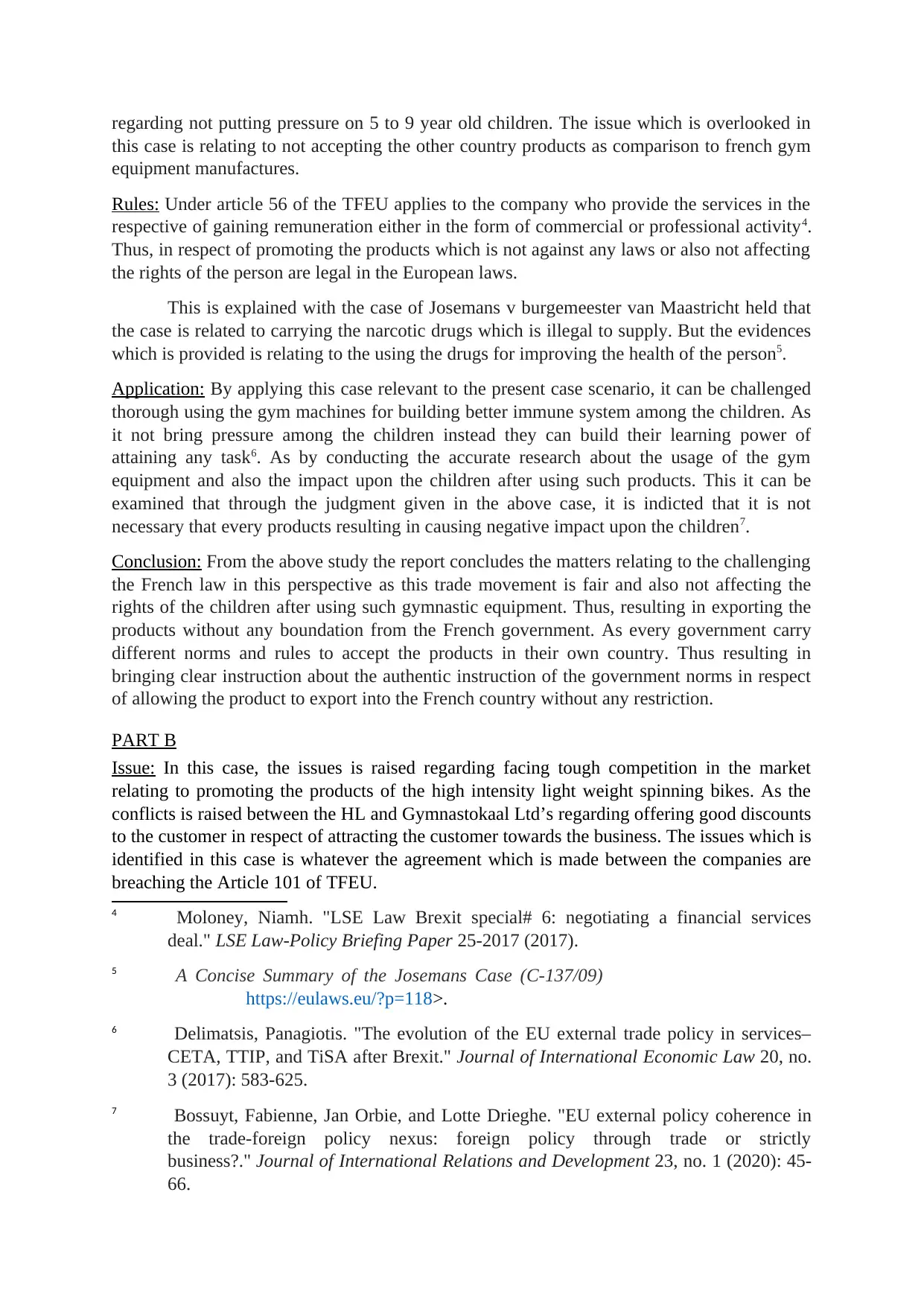
regarding not putting pressure on 5 to 9 year old children. The issue which is overlooked in
this case is relating to not accepting the other country products as comparison to french gym
equipment manufactures.
Rules: Under article 56 of the TFEU applies to the company who provide the services in the
respective of gaining remuneration either in the form of commercial or professional activity4.
Thus, in respect of promoting the products which is not against any laws or also not affecting
the rights of the person are legal in the European laws.
This is explained with the case of Josemans v burgemeester van Maastricht held that
the case is related to carrying the narcotic drugs which is illegal to supply. But the evidences
which is provided is relating to the using the drugs for improving the health of the person5.
Application: By applying this case relevant to the present case scenario, it can be challenged
thorough using the gym machines for building better immune system among the children. As
it not bring pressure among the children instead they can build their learning power of
attaining any task6. As by conducting the accurate research about the usage of the gym
equipment and also the impact upon the children after using such products. This it can be
examined that through the judgment given in the above case, it is indicted that it is not
necessary that every products resulting in causing negative impact upon the children7.
Conclusion: From the above study the report concludes the matters relating to the challenging
the French law in this perspective as this trade movement is fair and also not affecting the
rights of the children after using such gymnastic equipment. Thus, resulting in exporting the
products without any boundation from the French government. As every government carry
different norms and rules to accept the products in their own country. Thus resulting in
bringing clear instruction about the authentic instruction of the government norms in respect
of allowing the product to export into the French country without any restriction.
PART B
Issue: In this case, the issues is raised regarding facing tough competition in the market
relating to promoting the products of the high intensity light weight spinning bikes. As the
conflicts is raised between the HL and Gymnastokaal Ltd’s regarding offering good discounts
to the customer in respect of attracting the customer towards the business. The issues which is
identified in this case is whatever the agreement which is made between the companies are
breaching the Article 101 of TFEU.
4 Moloney, Niamh. "LSE Law Brexit special# 6: negotiating a financial services
deal." LSE Law-Policy Briefing Paper 25-2017 (2017).
5 A Concise Summary of the Josemans Case (C-137/09). 2020. [Online]. Available
through: <https://eulaws.eu/?p=118>.
6 Delimatsis, Panagiotis. "The evolution of the EU external trade policy in services–
CETA, TTIP, and TiSA after Brexit." Journal of International Economic Law 20, no.
3 (2017): 583-625.
7 Bossuyt, Fabienne, Jan Orbie, and Lotte Drieghe. "EU external policy coherence in
the trade-foreign policy nexus: foreign policy through trade or strictly
business?." Journal of International Relations and Development 23, no. 1 (2020): 45-
66.
this case is relating to not accepting the other country products as comparison to french gym
equipment manufactures.
Rules: Under article 56 of the TFEU applies to the company who provide the services in the
respective of gaining remuneration either in the form of commercial or professional activity4.
Thus, in respect of promoting the products which is not against any laws or also not affecting
the rights of the person are legal in the European laws.
This is explained with the case of Josemans v burgemeester van Maastricht held that
the case is related to carrying the narcotic drugs which is illegal to supply. But the evidences
which is provided is relating to the using the drugs for improving the health of the person5.
Application: By applying this case relevant to the present case scenario, it can be challenged
thorough using the gym machines for building better immune system among the children. As
it not bring pressure among the children instead they can build their learning power of
attaining any task6. As by conducting the accurate research about the usage of the gym
equipment and also the impact upon the children after using such products. This it can be
examined that through the judgment given in the above case, it is indicted that it is not
necessary that every products resulting in causing negative impact upon the children7.
Conclusion: From the above study the report concludes the matters relating to the challenging
the French law in this perspective as this trade movement is fair and also not affecting the
rights of the children after using such gymnastic equipment. Thus, resulting in exporting the
products without any boundation from the French government. As every government carry
different norms and rules to accept the products in their own country. Thus resulting in
bringing clear instruction about the authentic instruction of the government norms in respect
of allowing the product to export into the French country without any restriction.
PART B
Issue: In this case, the issues is raised regarding facing tough competition in the market
relating to promoting the products of the high intensity light weight spinning bikes. As the
conflicts is raised between the HL and Gymnastokaal Ltd’s regarding offering good discounts
to the customer in respect of attracting the customer towards the business. The issues which is
identified in this case is whatever the agreement which is made between the companies are
breaching the Article 101 of TFEU.
4 Moloney, Niamh. "LSE Law Brexit special# 6: negotiating a financial services
deal." LSE Law-Policy Briefing Paper 25-2017 (2017).
5 A Concise Summary of the Josemans Case (C-137/09). 2020. [Online]. Available
through: <https://eulaws.eu/?p=118>.
6 Delimatsis, Panagiotis. "The evolution of the EU external trade policy in services–
CETA, TTIP, and TiSA after Brexit." Journal of International Economic Law 20, no.
3 (2017): 583-625.
7 Bossuyt, Fabienne, Jan Orbie, and Lotte Drieghe. "EU external policy coherence in
the trade-foreign policy nexus: foreign policy through trade or strictly
business?." Journal of International Relations and Development 23, no. 1 (2020): 45-
66.
Secure Best Marks with AI Grader
Need help grading? Try our AI Grader for instant feedback on your assignments.
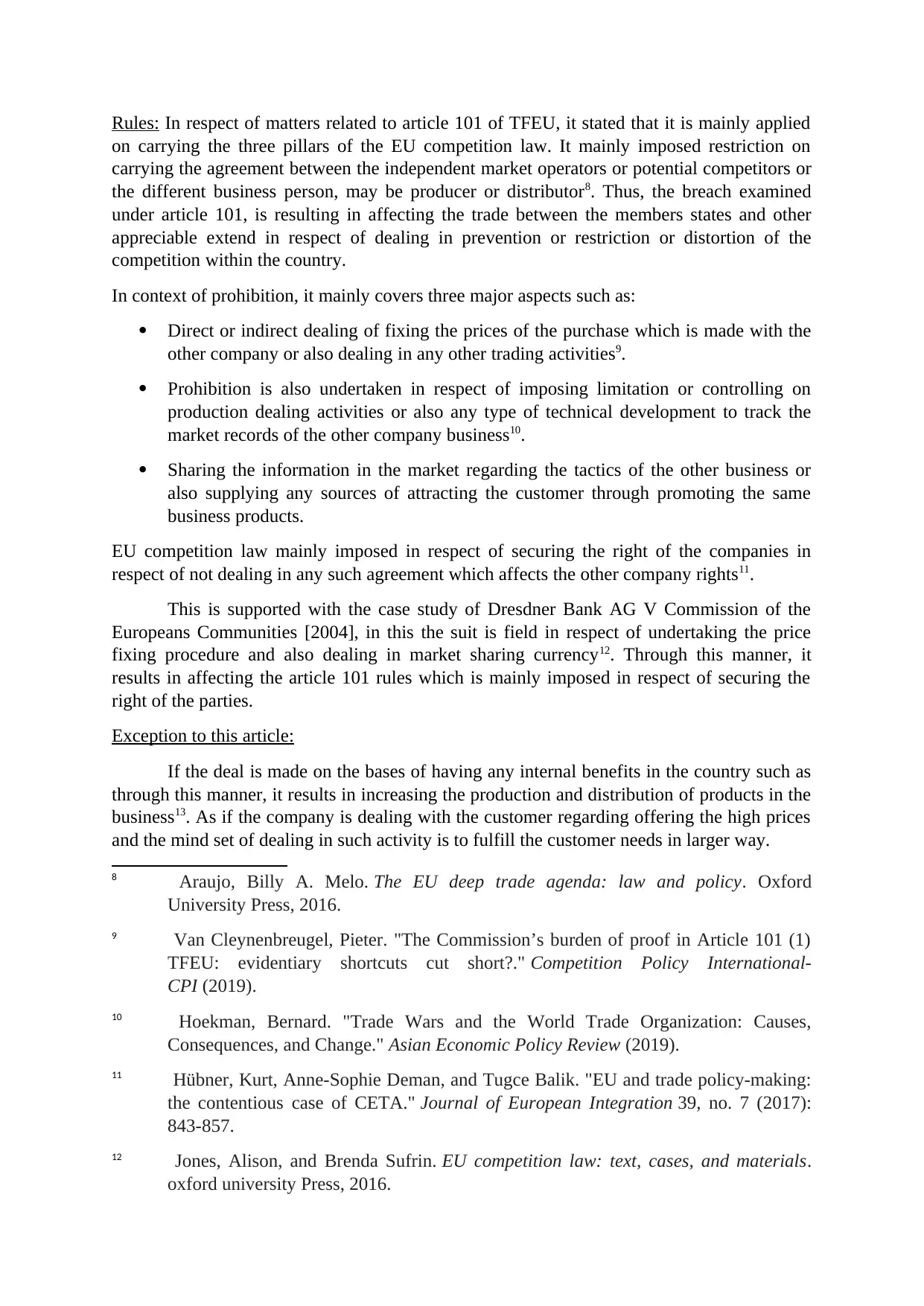
Rules: In respect of matters related to article 101 of TFEU, it stated that it is mainly applied
on carrying the three pillars of the EU competition law. It mainly imposed restriction on
carrying the agreement between the independent market operators or potential competitors or
the different business person, may be producer or distributor8. Thus, the breach examined
under article 101, is resulting in affecting the trade between the members states and other
appreciable extend in respect of dealing in prevention or restriction or distortion of the
competition within the country.
In context of prohibition, it mainly covers three major aspects such as:
Direct or indirect dealing of fixing the prices of the purchase which is made with the
other company or also dealing in any other trading activities9.
Prohibition is also undertaken in respect of imposing limitation or controlling on
production dealing activities or also any type of technical development to track the
market records of the other company business10.
Sharing the information in the market regarding the tactics of the other business or
also supplying any sources of attracting the customer through promoting the same
business products.
EU competition law mainly imposed in respect of securing the right of the companies in
respect of not dealing in any such agreement which affects the other company rights11.
This is supported with the case study of Dresdner Bank AG V Commission of the
Europeans Communities [2004], in this the suit is field in respect of undertaking the price
fixing procedure and also dealing in market sharing currency12. Through this manner, it
results in affecting the article 101 rules which is mainly imposed in respect of securing the
right of the parties.
Exception to this article:
If the deal is made on the bases of having any internal benefits in the country such as
through this manner, it results in increasing the production and distribution of products in the
business13. As if the company is dealing with the customer regarding offering the high prices
and the mind set of dealing in such activity is to fulfill the customer needs in larger way.
8 Araujo, Billy A. Melo. The EU deep trade agenda: law and policy. Oxford
University Press, 2016.
9 Van Cleynenbreugel, Pieter. "The Commission’s burden of proof in Article 101 (1)
TFEU: evidentiary shortcuts cut short?." Competition Policy International-
CPI (2019).
10 Hoekman, Bernard. "Trade Wars and the World Trade Organization: Causes,
Consequences, and Change." Asian Economic Policy Review (2019).
11 Hübner, Kurt, Anne-Sophie Deman, and Tugce Balik. "EU and trade policy-making:
the contentious case of CETA." Journal of European Integration 39, no. 7 (2017):
843-857.
12 Jones, Alison, and Brenda Sufrin. EU competition law: text, cases, and materials.
oxford university Press, 2016.
on carrying the three pillars of the EU competition law. It mainly imposed restriction on
carrying the agreement between the independent market operators or potential competitors or
the different business person, may be producer or distributor8. Thus, the breach examined
under article 101, is resulting in affecting the trade between the members states and other
appreciable extend in respect of dealing in prevention or restriction or distortion of the
competition within the country.
In context of prohibition, it mainly covers three major aspects such as:
Direct or indirect dealing of fixing the prices of the purchase which is made with the
other company or also dealing in any other trading activities9.
Prohibition is also undertaken in respect of imposing limitation or controlling on
production dealing activities or also any type of technical development to track the
market records of the other company business10.
Sharing the information in the market regarding the tactics of the other business or
also supplying any sources of attracting the customer through promoting the same
business products.
EU competition law mainly imposed in respect of securing the right of the companies in
respect of not dealing in any such agreement which affects the other company rights11.
This is supported with the case study of Dresdner Bank AG V Commission of the
Europeans Communities [2004], in this the suit is field in respect of undertaking the price
fixing procedure and also dealing in market sharing currency12. Through this manner, it
results in affecting the article 101 rules which is mainly imposed in respect of securing the
right of the parties.
Exception to this article:
If the deal is made on the bases of having any internal benefits in the country such as
through this manner, it results in increasing the production and distribution of products in the
business13. As if the company is dealing with the customer regarding offering the high prices
and the mind set of dealing in such activity is to fulfill the customer needs in larger way.
8 Araujo, Billy A. Melo. The EU deep trade agenda: law and policy. Oxford
University Press, 2016.
9 Van Cleynenbreugel, Pieter. "The Commission’s burden of proof in Article 101 (1)
TFEU: evidentiary shortcuts cut short?." Competition Policy International-
CPI (2019).
10 Hoekman, Bernard. "Trade Wars and the World Trade Organization: Causes,
Consequences, and Change." Asian Economic Policy Review (2019).
11 Hübner, Kurt, Anne-Sophie Deman, and Tugce Balik. "EU and trade policy-making:
the contentious case of CETA." Journal of European Integration 39, no. 7 (2017):
843-857.
12 Jones, Alison, and Brenda Sufrin. EU competition law: text, cases, and materials.
oxford university Press, 2016.
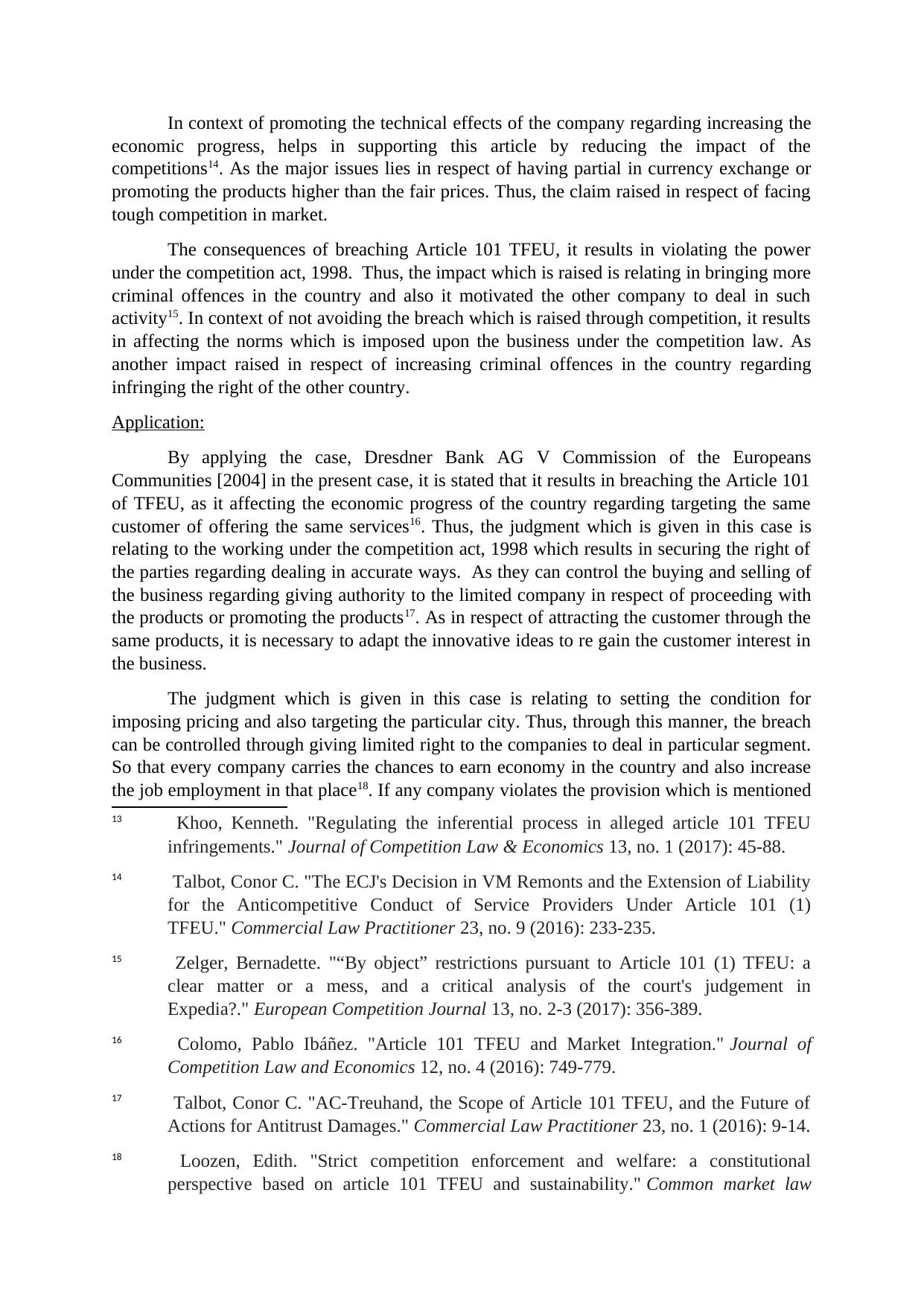
In context of promoting the technical effects of the company regarding increasing the
economic progress, helps in supporting this article by reducing the impact of the
competitions14. As the major issues lies in respect of having partial in currency exchange or
promoting the products higher than the fair prices. Thus, the claim raised in respect of facing
tough competition in market.
The consequences of breaching Article 101 TFEU, it results in violating the power
under the competition act, 1998. Thus, the impact which is raised is relating in bringing more
criminal offences in the country and also it motivated the other company to deal in such
activity15. In context of not avoiding the breach which is raised through competition, it results
in affecting the norms which is imposed upon the business under the competition law. As
another impact raised in respect of increasing criminal offences in the country regarding
infringing the right of the other country.
Application:
By applying the case, Dresdner Bank AG V Commission of the Europeans
Communities [2004] in the present case, it is stated that it results in breaching the Article 101
of TFEU, as it affecting the economic progress of the country regarding targeting the same
customer of offering the same services16. Thus, the judgment which is given in this case is
relating to the working under the competition act, 1998 which results in securing the right of
the parties regarding dealing in accurate ways. As they can control the buying and selling of
the business regarding giving authority to the limited company in respect of proceeding with
the products or promoting the products17. As in respect of attracting the customer through the
same products, it is necessary to adapt the innovative ideas to re gain the customer interest in
the business.
The judgment which is given in this case is relating to setting the condition for
imposing pricing and also targeting the particular city. Thus, through this manner, the breach
can be controlled through giving limited right to the companies to deal in particular segment.
So that every company carries the chances to earn economy in the country and also increase
the job employment in that place18. If any company violates the provision which is mentioned
13 Khoo, Kenneth. "Regulating the inferential process in alleged article 101 TFEU
infringements." Journal of Competition Law & Economics 13, no. 1 (2017): 45-88.
14 Talbot, Conor C. "The ECJ's Decision in VM Remonts and the Extension of Liability
for the Anticompetitive Conduct of Service Providers Under Article 101 (1)
TFEU." Commercial Law Practitioner 23, no. 9 (2016): 233-235.
15 Zelger, Bernadette. "“By object” restrictions pursuant to Article 101 (1) TFEU: a
clear matter or a mess, and a critical analysis of the court's judgement in
Expedia?." European Competition Journal 13, no. 2-3 (2017): 356-389.
16 Colomo, Pablo Ibáñez. "Article 101 TFEU and Market Integration." Journal of
Competition Law and Economics 12, no. 4 (2016): 749-779.
17 Talbot, Conor C. "AC-Treuhand, the Scope of Article 101 TFEU, and the Future of
Actions for Antitrust Damages." Commercial Law Practitioner 23, no. 1 (2016): 9-14.
18 Loozen, Edith. "Strict competition enforcement and welfare: a constitutional
perspective based on article 101 TFEU and sustainability." Common market law
economic progress, helps in supporting this article by reducing the impact of the
competitions14. As the major issues lies in respect of having partial in currency exchange or
promoting the products higher than the fair prices. Thus, the claim raised in respect of facing
tough competition in market.
The consequences of breaching Article 101 TFEU, it results in violating the power
under the competition act, 1998. Thus, the impact which is raised is relating in bringing more
criminal offences in the country and also it motivated the other company to deal in such
activity15. In context of not avoiding the breach which is raised through competition, it results
in affecting the norms which is imposed upon the business under the competition law. As
another impact raised in respect of increasing criminal offences in the country regarding
infringing the right of the other country.
Application:
By applying the case, Dresdner Bank AG V Commission of the Europeans
Communities [2004] in the present case, it is stated that it results in breaching the Article 101
of TFEU, as it affecting the economic progress of the country regarding targeting the same
customer of offering the same services16. Thus, the judgment which is given in this case is
relating to the working under the competition act, 1998 which results in securing the right of
the parties regarding dealing in accurate ways. As they can control the buying and selling of
the business regarding giving authority to the limited company in respect of proceeding with
the products or promoting the products17. As in respect of attracting the customer through the
same products, it is necessary to adapt the innovative ideas to re gain the customer interest in
the business.
The judgment which is given in this case is relating to setting the condition for
imposing pricing and also targeting the particular city. Thus, through this manner, the breach
can be controlled through giving limited right to the companies to deal in particular segment.
So that every company carries the chances to earn economy in the country and also increase
the job employment in that place18. If any company violates the provision which is mentioned
13 Khoo, Kenneth. "Regulating the inferential process in alleged article 101 TFEU
infringements." Journal of Competition Law & Economics 13, no. 1 (2017): 45-88.
14 Talbot, Conor C. "The ECJ's Decision in VM Remonts and the Extension of Liability
for the Anticompetitive Conduct of Service Providers Under Article 101 (1)
TFEU." Commercial Law Practitioner 23, no. 9 (2016): 233-235.
15 Zelger, Bernadette. "“By object” restrictions pursuant to Article 101 (1) TFEU: a
clear matter or a mess, and a critical analysis of the court's judgement in
Expedia?." European Competition Journal 13, no. 2-3 (2017): 356-389.
16 Colomo, Pablo Ibáñez. "Article 101 TFEU and Market Integration." Journal of
Competition Law and Economics 12, no. 4 (2016): 749-779.
17 Talbot, Conor C. "AC-Treuhand, the Scope of Article 101 TFEU, and the Future of
Actions for Antitrust Damages." Commercial Law Practitioner 23, no. 1 (2016): 9-14.
18 Loozen, Edith. "Strict competition enforcement and welfare: a constitutional
perspective based on article 101 TFEU and sustainability." Common market law
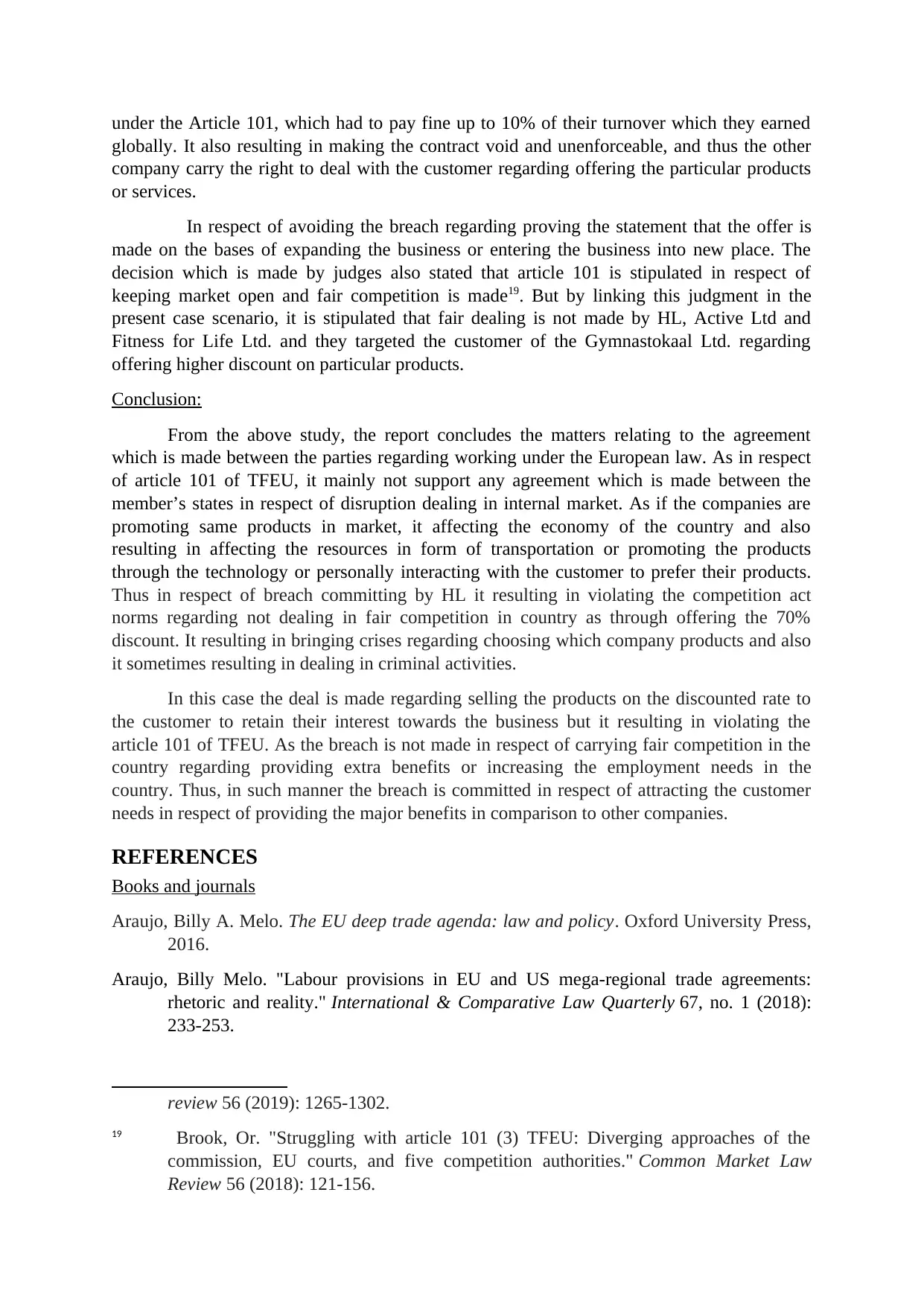
under the Article 101, which had to pay fine up to 10% of their turnover which they earned
globally. It also resulting in making the contract void and unenforceable, and thus the other
company carry the right to deal with the customer regarding offering the particular products
or services.
In respect of avoiding the breach regarding proving the statement that the offer is
made on the bases of expanding the business or entering the business into new place. The
decision which is made by judges also stated that article 101 is stipulated in respect of
keeping market open and fair competition is made19. But by linking this judgment in the
present case scenario, it is stipulated that fair dealing is not made by HL, Active Ltd and
Fitness for Life Ltd. and they targeted the customer of the Gymnastokaal Ltd. regarding
offering higher discount on particular products.
Conclusion:
From the above study, the report concludes the matters relating to the agreement
which is made between the parties regarding working under the European law. As in respect
of article 101 of TFEU, it mainly not support any agreement which is made between the
member’s states in respect of disruption dealing in internal market. As if the companies are
promoting same products in market, it affecting the economy of the country and also
resulting in affecting the resources in form of transportation or promoting the products
through the technology or personally interacting with the customer to prefer their products.
Thus in respect of breach committing by HL it resulting in violating the competition act
norms regarding not dealing in fair competition in country as through offering the 70%
discount. It resulting in bringing crises regarding choosing which company products and also
it sometimes resulting in dealing in criminal activities.
In this case the deal is made regarding selling the products on the discounted rate to
the customer to retain their interest towards the business but it resulting in violating the
article 101 of TFEU. As the breach is not made in respect of carrying fair competition in the
country regarding providing extra benefits or increasing the employment needs in the
country. Thus, in such manner the breach is committed in respect of attracting the customer
needs in respect of providing the major benefits in comparison to other companies.
REFERENCES
Books and journals
Araujo, Billy A. Melo. The EU deep trade agenda: law and policy. Oxford University Press,
2016.
Araujo, Billy Melo. "Labour provisions in EU and US mega-regional trade agreements:
rhetoric and reality." International & Comparative Law Quarterly 67, no. 1 (2018):
233-253.
review 56 (2019): 1265-1302.
19 Brook, Or. "Struggling with article 101 (3) TFEU: Diverging approaches of the
commission, EU courts, and five competition authorities." Common Market Law
Review 56 (2018): 121-156.
globally. It also resulting in making the contract void and unenforceable, and thus the other
company carry the right to deal with the customer regarding offering the particular products
or services.
In respect of avoiding the breach regarding proving the statement that the offer is
made on the bases of expanding the business or entering the business into new place. The
decision which is made by judges also stated that article 101 is stipulated in respect of
keeping market open and fair competition is made19. But by linking this judgment in the
present case scenario, it is stipulated that fair dealing is not made by HL, Active Ltd and
Fitness for Life Ltd. and they targeted the customer of the Gymnastokaal Ltd. regarding
offering higher discount on particular products.
Conclusion:
From the above study, the report concludes the matters relating to the agreement
which is made between the parties regarding working under the European law. As in respect
of article 101 of TFEU, it mainly not support any agreement which is made between the
member’s states in respect of disruption dealing in internal market. As if the companies are
promoting same products in market, it affecting the economy of the country and also
resulting in affecting the resources in form of transportation or promoting the products
through the technology or personally interacting with the customer to prefer their products.
Thus in respect of breach committing by HL it resulting in violating the competition act
norms regarding not dealing in fair competition in country as through offering the 70%
discount. It resulting in bringing crises regarding choosing which company products and also
it sometimes resulting in dealing in criminal activities.
In this case the deal is made regarding selling the products on the discounted rate to
the customer to retain their interest towards the business but it resulting in violating the
article 101 of TFEU. As the breach is not made in respect of carrying fair competition in the
country regarding providing extra benefits or increasing the employment needs in the
country. Thus, in such manner the breach is committed in respect of attracting the customer
needs in respect of providing the major benefits in comparison to other companies.
REFERENCES
Books and journals
Araujo, Billy A. Melo. The EU deep trade agenda: law and policy. Oxford University Press,
2016.
Araujo, Billy Melo. "Labour provisions in EU and US mega-regional trade agreements:
rhetoric and reality." International & Comparative Law Quarterly 67, no. 1 (2018):
233-253.
review 56 (2019): 1265-1302.
19 Brook, Or. "Struggling with article 101 (3) TFEU: Diverging approaches of the
commission, EU courts, and five competition authorities." Common Market Law
Review 56 (2018): 121-156.
Paraphrase This Document
Need a fresh take? Get an instant paraphrase of this document with our AI Paraphraser
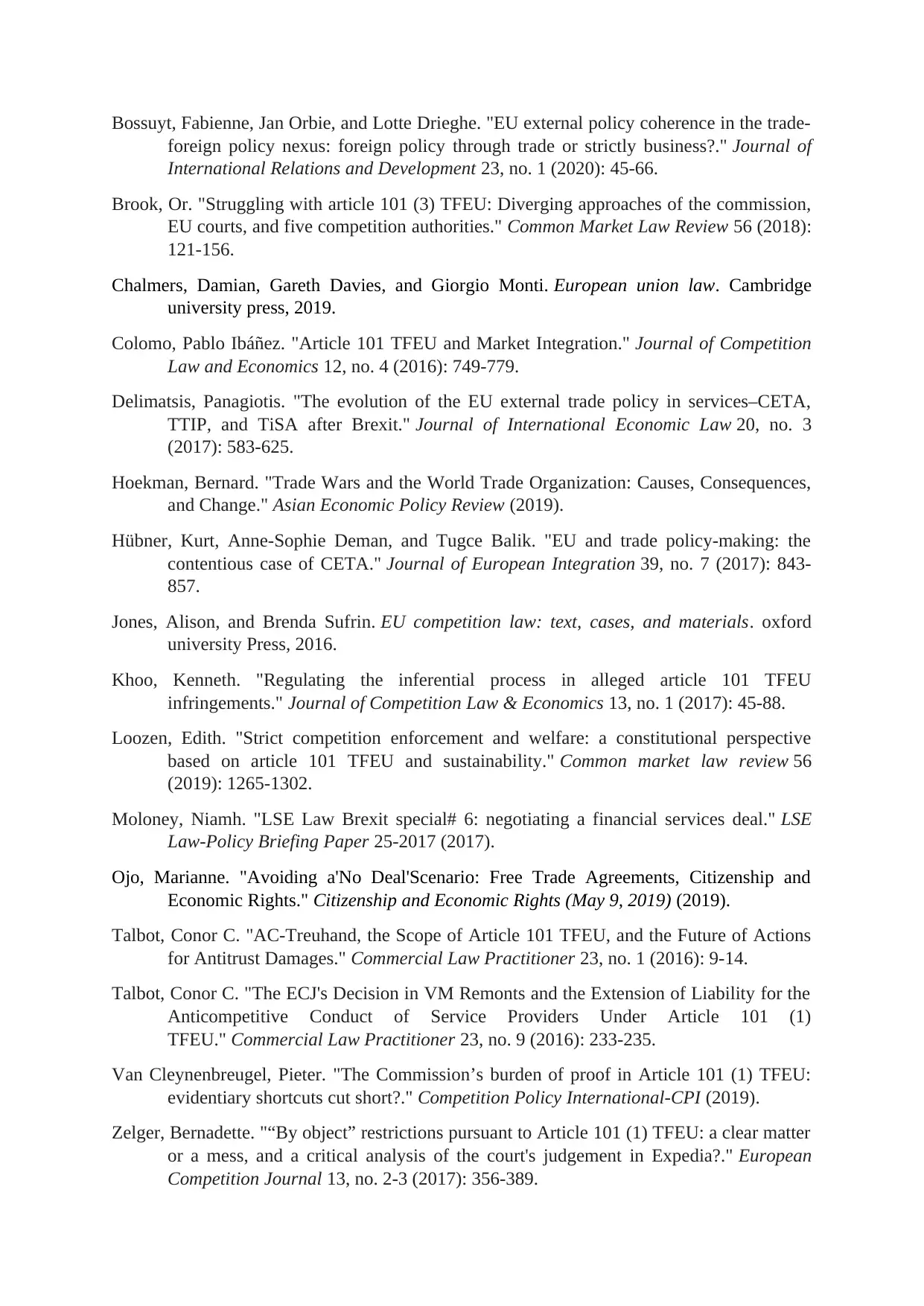
Bossuyt, Fabienne, Jan Orbie, and Lotte Drieghe. "EU external policy coherence in the trade-
foreign policy nexus: foreign policy through trade or strictly business?." Journal of
International Relations and Development 23, no. 1 (2020): 45-66.
Brook, Or. "Struggling with article 101 (3) TFEU: Diverging approaches of the commission,
EU courts, and five competition authorities." Common Market Law Review 56 (2018):
121-156.
Chalmers, Damian, Gareth Davies, and Giorgio Monti. European union law. Cambridge
university press, 2019.
Colomo, Pablo Ibáñez. "Article 101 TFEU and Market Integration." Journal of Competition
Law and Economics 12, no. 4 (2016): 749-779.
Delimatsis, Panagiotis. "The evolution of the EU external trade policy in services–CETA,
TTIP, and TiSA after Brexit." Journal of International Economic Law 20, no. 3
(2017): 583-625.
Hoekman, Bernard. "Trade Wars and the World Trade Organization: Causes, Consequences,
and Change." Asian Economic Policy Review (2019).
Hübner, Kurt, Anne-Sophie Deman, and Tugce Balik. "EU and trade policy-making: the
contentious case of CETA." Journal of European Integration 39, no. 7 (2017): 843-
857.
Jones, Alison, and Brenda Sufrin. EU competition law: text, cases, and materials. oxford
university Press, 2016.
Khoo, Kenneth. "Regulating the inferential process in alleged article 101 TFEU
infringements." Journal of Competition Law & Economics 13, no. 1 (2017): 45-88.
Loozen, Edith. "Strict competition enforcement and welfare: a constitutional perspective
based on article 101 TFEU and sustainability." Common market law review 56
(2019): 1265-1302.
Moloney, Niamh. "LSE Law Brexit special# 6: negotiating a financial services deal." LSE
Law-Policy Briefing Paper 25-2017 (2017).
Ojo, Marianne. "Avoiding a'No Deal'Scenario: Free Trade Agreements, Citizenship and
Economic Rights." Citizenship and Economic Rights (May 9, 2019) (2019).
Talbot, Conor C. "AC-Treuhand, the Scope of Article 101 TFEU, and the Future of Actions
for Antitrust Damages." Commercial Law Practitioner 23, no. 1 (2016): 9-14.
Talbot, Conor C. "The ECJ's Decision in VM Remonts and the Extension of Liability for the
Anticompetitive Conduct of Service Providers Under Article 101 (1)
TFEU." Commercial Law Practitioner 23, no. 9 (2016): 233-235.
Van Cleynenbreugel, Pieter. "The Commission’s burden of proof in Article 101 (1) TFEU:
evidentiary shortcuts cut short?." Competition Policy International-CPI (2019).
Zelger, Bernadette. "“By object” restrictions pursuant to Article 101 (1) TFEU: a clear matter
or a mess, and a critical analysis of the court's judgement in Expedia?." European
Competition Journal 13, no. 2-3 (2017): 356-389.
foreign policy nexus: foreign policy through trade or strictly business?." Journal of
International Relations and Development 23, no. 1 (2020): 45-66.
Brook, Or. "Struggling with article 101 (3) TFEU: Diverging approaches of the commission,
EU courts, and five competition authorities." Common Market Law Review 56 (2018):
121-156.
Chalmers, Damian, Gareth Davies, and Giorgio Monti. European union law. Cambridge
university press, 2019.
Colomo, Pablo Ibáñez. "Article 101 TFEU and Market Integration." Journal of Competition
Law and Economics 12, no. 4 (2016): 749-779.
Delimatsis, Panagiotis. "The evolution of the EU external trade policy in services–CETA,
TTIP, and TiSA after Brexit." Journal of International Economic Law 20, no. 3
(2017): 583-625.
Hoekman, Bernard. "Trade Wars and the World Trade Organization: Causes, Consequences,
and Change." Asian Economic Policy Review (2019).
Hübner, Kurt, Anne-Sophie Deman, and Tugce Balik. "EU and trade policy-making: the
contentious case of CETA." Journal of European Integration 39, no. 7 (2017): 843-
857.
Jones, Alison, and Brenda Sufrin. EU competition law: text, cases, and materials. oxford
university Press, 2016.
Khoo, Kenneth. "Regulating the inferential process in alleged article 101 TFEU
infringements." Journal of Competition Law & Economics 13, no. 1 (2017): 45-88.
Loozen, Edith. "Strict competition enforcement and welfare: a constitutional perspective
based on article 101 TFEU and sustainability." Common market law review 56
(2019): 1265-1302.
Moloney, Niamh. "LSE Law Brexit special# 6: negotiating a financial services deal." LSE
Law-Policy Briefing Paper 25-2017 (2017).
Ojo, Marianne. "Avoiding a'No Deal'Scenario: Free Trade Agreements, Citizenship and
Economic Rights." Citizenship and Economic Rights (May 9, 2019) (2019).
Talbot, Conor C. "AC-Treuhand, the Scope of Article 101 TFEU, and the Future of Actions
for Antitrust Damages." Commercial Law Practitioner 23, no. 1 (2016): 9-14.
Talbot, Conor C. "The ECJ's Decision in VM Remonts and the Extension of Liability for the
Anticompetitive Conduct of Service Providers Under Article 101 (1)
TFEU." Commercial Law Practitioner 23, no. 9 (2016): 233-235.
Van Cleynenbreugel, Pieter. "The Commission’s burden of proof in Article 101 (1) TFEU:
evidentiary shortcuts cut short?." Competition Policy International-CPI (2019).
Zelger, Bernadette. "“By object” restrictions pursuant to Article 101 (1) TFEU: a clear matter
or a mess, and a critical analysis of the court's judgement in Expedia?." European
Competition Journal 13, no. 2-3 (2017): 356-389.
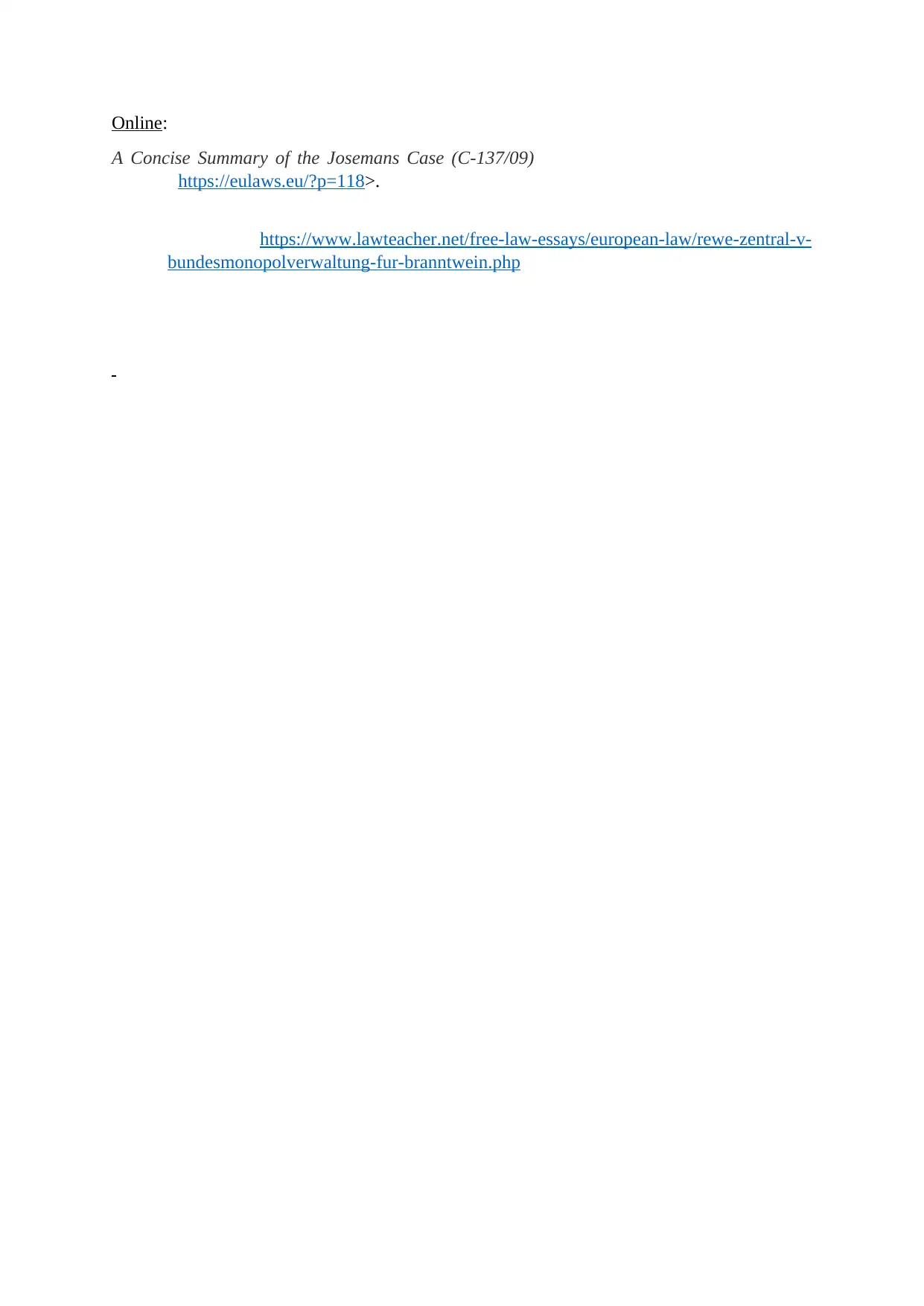
Online:
A Concise Summary of the Josemans Case (C-137/09). 2020. [Online]. Available through:
<https://eulaws.eu/?p=118>.
Rewe-Zentral AG v Bundesmonopolverwaltung für Branntwein. 2020. [Online]. Available
through: <https://www.lawteacher.net/free-law-essays/european-law/rewe-zentral-v-
bundesmonopolverwaltung-fur-branntwein.php >.
A Concise Summary of the Josemans Case (C-137/09). 2020. [Online]. Available through:
<https://eulaws.eu/?p=118>.
Rewe-Zentral AG v Bundesmonopolverwaltung für Branntwein. 2020. [Online]. Available
through: <https://www.lawteacher.net/free-law-essays/european-law/rewe-zentral-v-
bundesmonopolverwaltung-fur-branntwein.php >.
1 out of 9
Related Documents
Your All-in-One AI-Powered Toolkit for Academic Success.
+13062052269
info@desklib.com
Available 24*7 on WhatsApp / Email
![[object Object]](/_next/static/media/star-bottom.7253800d.svg)
Unlock your academic potential
© 2024 | Zucol Services PVT LTD | All rights reserved.





